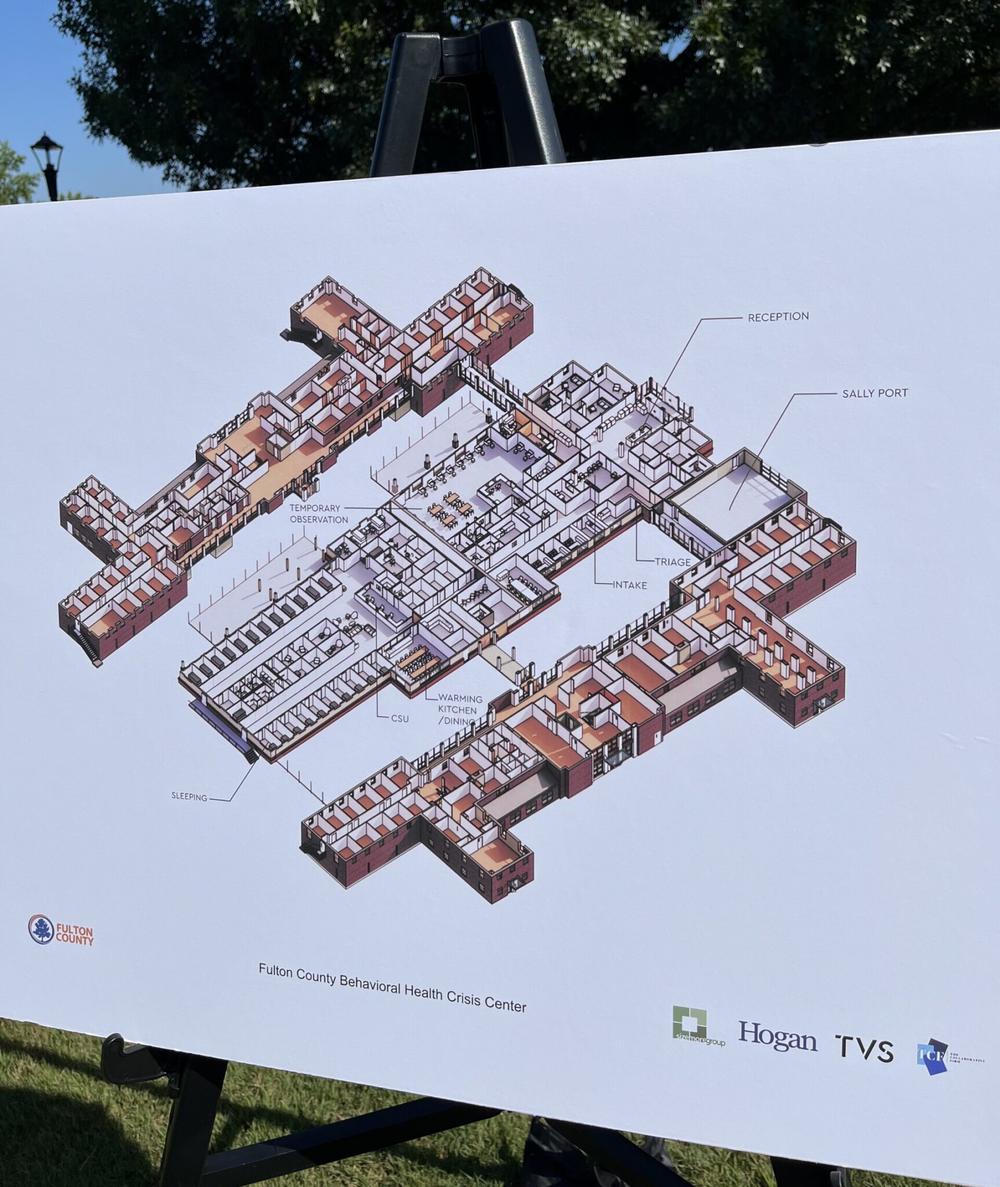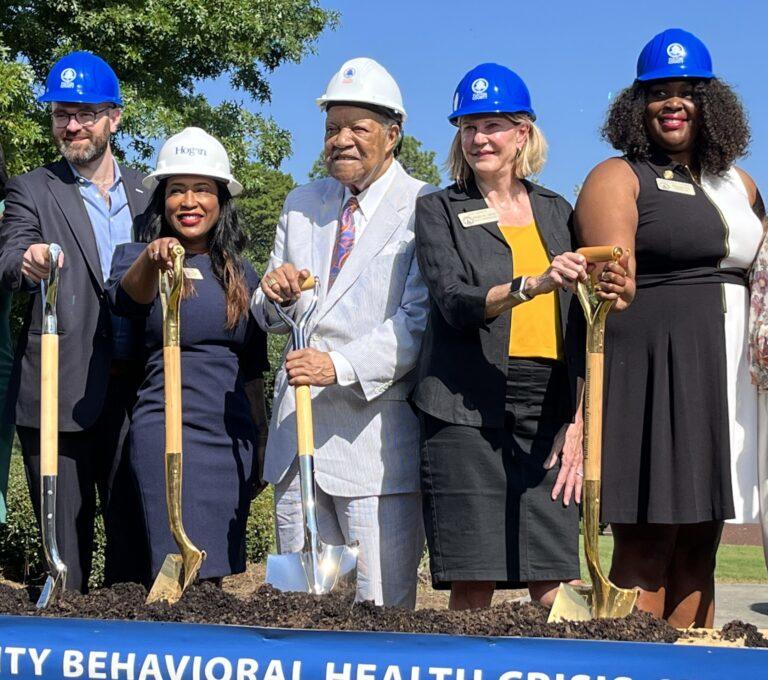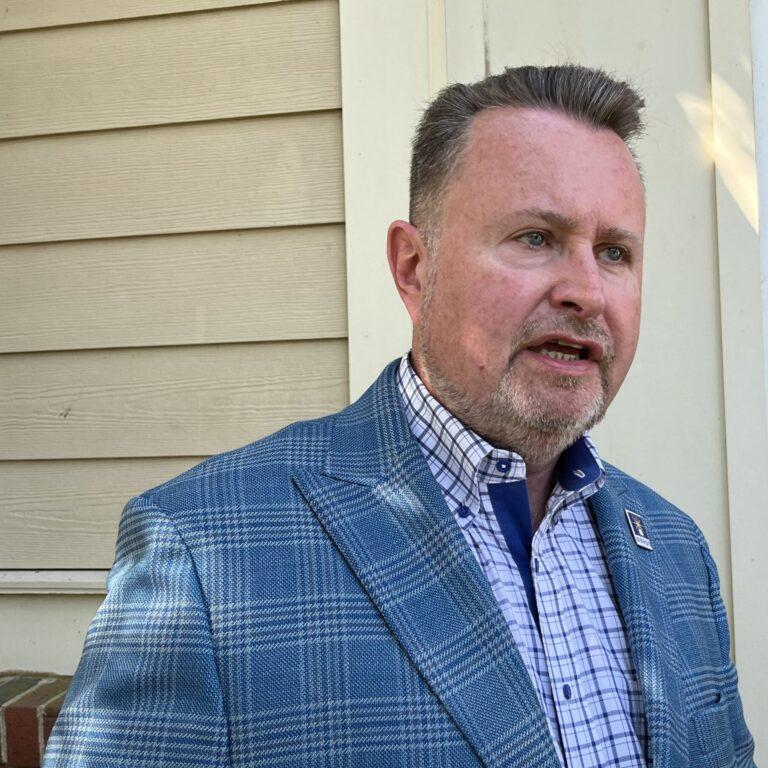
Caption
Rendering of the new Fulton County behavioral health crisis center, which will be built on the campus of Oak Hill Child, Family and Adolescent Center in southwest Atlanta.
Credit: Jill Nolin/Georgia Recorder

Rendering of the new Fulton County behavioral health crisis center, which will be built on the campus of Oak Hill Child, Family and Adolescent Center in southwest Atlanta.
State and local officials from both sides of the aisle took turns shoveling ceremonial dirt Monday to celebrate the groundbreaking of Fulton County’s first publicly funded behavioral health crisis center.
The Fulton County project is one of three new crisis centers funded in this year’s state budget. Two others, planned for Dublin and Augusta, are still in the planning and design phase.
The center is being built on county-owned property in Southwest Atlanta using a mixture of state dollars — $6.7 million in this year’s budget — and about $15 million in funding the county received through the federal American Rescue Plan Act. The state plans to spend about $10 million every year to run the center.
When the facility opens on the campus of Oak Hill Child, Family and Adolescent Center, it will include 15 in-patient beds and 18 observation chairs and provide services around the clock.

Speaker Pro Tem Jan Jones (second from right), a Milton Republican, shares a shovel with Rep. Mandisha Thomas, a South Fulton Democrat, at a groundbreaking Monday for Fulton County’s first behavioral health crisis center. Also pictured: Sen. Josh McLaurin, Rep. Tanya Miller and Fulton County Chairman Robb Pitts.
The center will serve Fulton County residents closer to home, taking pressure off surrounding overcrowded safety net centers. And state Rep. Tanya Miller, an Atlanta Democrat who represents the district where the center is being built, said it will also ease the burden on detention centers, which she said are functioning as “de facto mental health hospitals.”
It’s also being built at a time when a new national three-digit dialing code — 988 — is making it easier than ever to call or text for help, which is expected to increase demand on state behavioral health services.
“Last year, over 500 Fulton County residents sought help from behavioral health crisis centers around the state, but because of our joint investment, our Fulton County residents will no longer have to struggle to find the resources that they need,” said Robb Pitts, the Democratic chairman of the Fulton County Commission.
“Simply put, this facility will save lives,” Pitts said.
Fulton County state Rep. Jan Jones, a Milton Republican who serves as speaker pro tem in the state House, was credited Monday for helping to lock down the state aid for the crisis center.
“My argument was we have 10% of the state’s population. We certainly deserve some share of the resources, and we did not have a single one,” Jones said. “We really are in need of three of these. This is the first, I hope, of three.”
“It is not a panacea, but it is a needed support for people and families who are hurting,” she also said. “This is something we can all get on board with because suicide, serious mental health issues affect every single family.”
In addition to crisis services, the Fulton County center will also include a “living room” concept meant for residents with a lower level of need, saving the crisis beds for those in distress.
Kevin Tanner, commissioner of the Department of Behavioral Health and Developmental Disabilities, described the lower level of care as a stigma-free “calming environment” where someone can be observed for up to 23 hours.

Kevin Tanner, commissioner of the Department of Behavioral Health and Developmental Disabilities, talks to reporters Monday.
“This is a real signal throughout Georgia that recovery is real and those living with serious and persistent mental illness can recover and live a full life, just like us,” Tanner said of the project.
About $10.8 million is included in the current state budget to convert a crisis stabilization unit in Dublin to a behavioral health crisis center. And $7 million was budgeted for a crisis center in Augusta.
The state funding for all three centers survived the governor’s extensive list of budget “disregards” issued earlier this year. But with this pen, Gov. Brian Kemp stalled the deployment of a planned “enhanced” staffing model at the three new locations.
At the time, Kemp directed the state agency to continue to provide service based on projected usage “while ensuring equity across providers.”
Tanner said talks about how best to staff these crisis centers are ongoing as work begins on next year’s state budget.
“But all cylinders are firing on go and this facility is going to be built and it’s going to be operated,” Tanner told reporters Monday.
His agency is also taking a comprehensive look at the state’s crisis capacity to identify the system’s needs for in-patient and forensic beds. That report, as well as another looking at workforce needs, is on track to wrap up this month, Tanner said.
This story comes to GPB through a reporting partnership with Georgia Recorder.